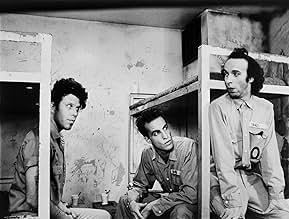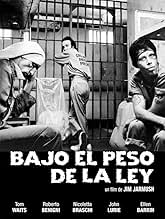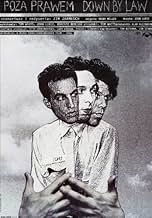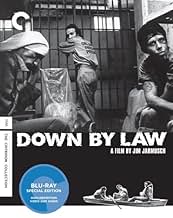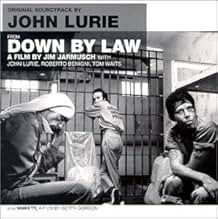AVALIAÇÃO DA IMDb
7,6/10
57 mil
SUA AVALIAÇÃO
Dois homens são incriminados e enviados à prisão, onde encontram um assassino que os ajuda a escapar e sair do estado.Dois homens são incriminados e enviados à prisão, onde encontram um assassino que os ajuda a escapar e sair do estado.Dois homens são incriminados e enviados à prisão, onde encontram um assassino que os ajuda a escapar e sair do estado.
- Direção
- Roteirista
- Artistas
- Prêmios
- 4 vitórias e 6 indicações no total
Joy N. Houck Jr.
- Detective Mandino
- (as Joy Houck Jr.)
Avaliações em destaque
Three men escape from jail and head out into the Louisiana bayous. What follows is their journey and their attempts to evade the law.
Written and directed by Jim Jarmusch, so you already know this is not going to be a conventional movie. Quirkily funny, with some great off-the-wall characters and good interplay between them. Plot is a bit random, though that's part of the movie's charm. The anarchy of the plot fits in well with the characters and general non-seriousness of the movie.
Good work by Tom Waits, John Lurie and Roberto Benigni in the lead roles.
Written and directed by Jim Jarmusch, so you already know this is not going to be a conventional movie. Quirkily funny, with some great off-the-wall characters and good interplay between them. Plot is a bit random, though that's part of the movie's charm. The anarchy of the plot fits in well with the characters and general non-seriousness of the movie.
Good work by Tom Waits, John Lurie and Roberto Benigni in the lead roles.
The story of three different men (Tom Waits, John Lurie, and Roberto Benigni) in a Louisiana prison and their eventual journey.
This film is a natural progression from "Stranger Than Paradise". Lurie returns as a lead, and the music of Screamin' Jay Hawkins is replaced with Tom Waits. If Hawkins and Waits know each other, I have no idea, but their music styles are not far removed.
Although Waits is among my favorite actors (he excels at playing villains), the standout performance here is Benigni. How much English he knew at the time I am not sure, but he brings a comic mischief to the film, and is the most light-hearted despite being potentially the most dangerous.
This film is a natural progression from "Stranger Than Paradise". Lurie returns as a lead, and the music of Screamin' Jay Hawkins is replaced with Tom Waits. If Hawkins and Waits know each other, I have no idea, but their music styles are not far removed.
Although Waits is among my favorite actors (he excels at playing villains), the standout performance here is Benigni. How much English he knew at the time I am not sure, but he brings a comic mischief to the film, and is the most light-hearted despite being potentially the most dangerous.
Wow, what a movie. Far away from Hollywood, Jim Jarmusch creates a world where you don't need drama, pathos and action to fascinate the watcher. Because fascinating is exactly what this movie is. A plot in the classical sense is almost completely missing; the scenes, in their simplicity sometimes reminding of theater, follow each other without ever creating real suspense; neither griping action nor complex dialogues are there to excite the spectator. And still, with ease Jarmusch fills more than a hundred minutes with a story you won't take your eyes off. It is hard to tell what the atmosphere of the movie is really based on, the characters, the setting, entirely in black and white, the music - probably all of it. Again, like in Jarmusch's later movie "Dead man", speed is an important factor: everything moves slowly, without haste, as there is no dramatic climax you could hurry towards; yet, boring is a word that certainly doesn't fit this piece of cineastic art. On the other hand, though some of the scenes seem quite surrealistic, it is not a really artistic movie breaking with all the traditional concepts of filmmaking; it is more a movie in classic shape with an unconventional story, not trying to shock, to confuse or even to make you think so much; this movie doesn't need all this to get your complete attention. You could probably speculate a lot about the meaning of the movie; to me, this seems highly unnecessary. Just let it unfold its atmosphere. Judge yourselves, but I was excited in a very special way by every scene of this motion picture, giving me one of my best cineastic experiences of the recent time.
A prison film without an overt sense of morality? That comes as no surprise from Jim Jarmusch. One of the pioneers of independent filmmaking in the 1980s, Jarmusch cares little for plot or crafting a message for his audience and much more about drawing up scenarios for his characters that reveal nuances of the human condition.
"Down by Law" features three men in New Orleans who are guilty of their crimes though wrongfully imprisoned. Zack (Tom Waits) is a radio DJ who — after being thrown out by his girlfriend — agrees to a shady odd job driving a car that sets him up to take a fall. Jack (John Lurie) is a local pimp who ends up the victim of a sting operation. Both men feel unfairly hit just for letting their guard down. In prison they meet Bob (Roberto Benigni), an optimistic and overly friendly Italian immigrant with a similar story. The three men connect within confinement, but that bond is tested in new ways after they escape.
Aside from Zack and Jack's arrests, Jarmusch takes his laid back approach to most of the events in the film, choosing to show only the aftereffects of the major plot points that most filmmakers would want to depict on screen. He did the same thing in "Stranger Than Paradise" a couple years earlier, wanting to focus his film on how the characters respond to swings of fortune. The prison break, for example, is not explained. We only see the before followed by a cut to the three prisoners on the run.
Zack, Jack and Bob make for an interesting trio, particularly Bob. Benigni brings impeccable spirit and joviality to break up the somewhat slogging animosity between carefree cool guy Zack (Waits is spot-on casting) and the self-righteous, sarcastic Jack (deployed similarly to the way he was in "Stranger Than Paradise"). Benigni is specifically responsible for a couple of the film's best moments, one an ice cream protest and the other involving a rabbit. His comedy brings a dimension and energy to this film that "Paradise" was missing, and it fits within Jarmusch's style and framework.
"Down by Law" also feels more cinematic. Jarmusch includes more of the New Orleans setting and the Louisiana wilderness with dollying/trucking shots that help immerse his very intimate stories in something larger, in this case the lawlessness of NOLA and the swampland. Maybe Jarmusch doesn't have a neatly wrapped up moral to send us home with, his film clearly establishes a belief in an unpredictability to our world. And given the way his characters handle it, you can tell that he views humans as people who are eternally torn between self-interest and companionship.
Jarmusch's early work shows great vision of how he wants to tell stories, with less emphasis on what those stories are trying to say. It's as though he's running experiments with his characters, and what plays out in his films are the results. Fans of art films and theatre will surely appreciate these early offerings, while those who prefer a director take them on a ride rather than present them an experiment to observe will have trouble connecting.
~Steven C
Thanks for reading! Visit Movie Muse Reviews for more
"Down by Law" features three men in New Orleans who are guilty of their crimes though wrongfully imprisoned. Zack (Tom Waits) is a radio DJ who — after being thrown out by his girlfriend — agrees to a shady odd job driving a car that sets him up to take a fall. Jack (John Lurie) is a local pimp who ends up the victim of a sting operation. Both men feel unfairly hit just for letting their guard down. In prison they meet Bob (Roberto Benigni), an optimistic and overly friendly Italian immigrant with a similar story. The three men connect within confinement, but that bond is tested in new ways after they escape.
Aside from Zack and Jack's arrests, Jarmusch takes his laid back approach to most of the events in the film, choosing to show only the aftereffects of the major plot points that most filmmakers would want to depict on screen. He did the same thing in "Stranger Than Paradise" a couple years earlier, wanting to focus his film on how the characters respond to swings of fortune. The prison break, for example, is not explained. We only see the before followed by a cut to the three prisoners on the run.
Zack, Jack and Bob make for an interesting trio, particularly Bob. Benigni brings impeccable spirit and joviality to break up the somewhat slogging animosity between carefree cool guy Zack (Waits is spot-on casting) and the self-righteous, sarcastic Jack (deployed similarly to the way he was in "Stranger Than Paradise"). Benigni is specifically responsible for a couple of the film's best moments, one an ice cream protest and the other involving a rabbit. His comedy brings a dimension and energy to this film that "Paradise" was missing, and it fits within Jarmusch's style and framework.
"Down by Law" also feels more cinematic. Jarmusch includes more of the New Orleans setting and the Louisiana wilderness with dollying/trucking shots that help immerse his very intimate stories in something larger, in this case the lawlessness of NOLA and the swampland. Maybe Jarmusch doesn't have a neatly wrapped up moral to send us home with, his film clearly establishes a belief in an unpredictability to our world. And given the way his characters handle it, you can tell that he views humans as people who are eternally torn between self-interest and companionship.
Jarmusch's early work shows great vision of how he wants to tell stories, with less emphasis on what those stories are trying to say. It's as though he's running experiments with his characters, and what plays out in his films are the results. Fans of art films and theatre will surely appreciate these early offerings, while those who prefer a director take them on a ride rather than present them an experiment to observe will have trouble connecting.
~Steven C
Thanks for reading! Visit Movie Muse Reviews for more
A black comedy about three men deceived by luck and given to their destiny, after a stint in prison and a daring escape.
Beautiful cinematography in black and white by Robby Müller, taking advantage of the photogeny of the decadent south and the Mississippi delta, excellent music, divided between the songs by Tom Waits and the soundtrack by John Lurie (from The Lounge Lizzards), both protagonists of the film, joined by the inimitable Roberto Benigni (and his wife and muse Nicoletta Braschi) adding a touch of chaos and humor to the story.
A cult film that looks even better as the years go by.
Beautiful cinematography in black and white by Robby Müller, taking advantage of the photogeny of the decadent south and the Mississippi delta, excellent music, divided between the songs by Tom Waits and the soundtrack by John Lurie (from The Lounge Lizzards), both protagonists of the film, joined by the inimitable Roberto Benigni (and his wife and muse Nicoletta Braschi) adding a touch of chaos and humor to the story.
A cult film that looks even better as the years go by.
Você sabia?
- CuriosidadesRoberto Benigni's rabbit soliloquy was almost entirely self-written/improvisation, based on his own life experiences. His mother actually did raise rabbits.
- Erros de gravaçãoZack writes the number of the days he's spent in the cellar on the wall. Before he fights Jack for the first time, he angrily scribes two big lines (two days). In the next scene with Roberto, they are normal length.
- Trilhas sonorasJockey Full of Bourbon
Written and Performed by Tom Waits
from his 'Rain Dogs' album
Courtesy Island Records, Inc.
(opening title)
Principais escolhas
Faça login para avaliar e ver a lista de recomendações personalizadas
- How long is Down by Law?Fornecido pela Alexa
Detalhes
- Data de lançamento
- Países de origem
- Idiomas
- Também conhecido como
- Down by Law
- Locações de filme
- Empresas de produção
- Consulte mais créditos da empresa na IMDbPro
Bilheteria
- Orçamento
- US$ 1.100.000 (estimativa)
- Faturamento bruto nos EUA e Canadá
- US$ 1.435.668
- Faturamento bruto mundial
- US$ 1.529.206
- Tempo de duração1 hora 47 minutos
- Cor
- Mixagem de som
- Proporção
- 1.85 : 1
Contribua para esta página
Sugerir uma alteração ou adicionar conteúdo ausente



![Down by Law: The Criterion Collection [Blu-Ray]](https://m.media-amazon.com/images/M/MV5BMzk0ZDZhYmItNGNhYS00ZWI1LTg0OTYtMDdjOWNkODBlNTYzXkEyXkFqcGdeQXVyNzU1NzE3NTg@._V1_QL75_UX500_CR0)


